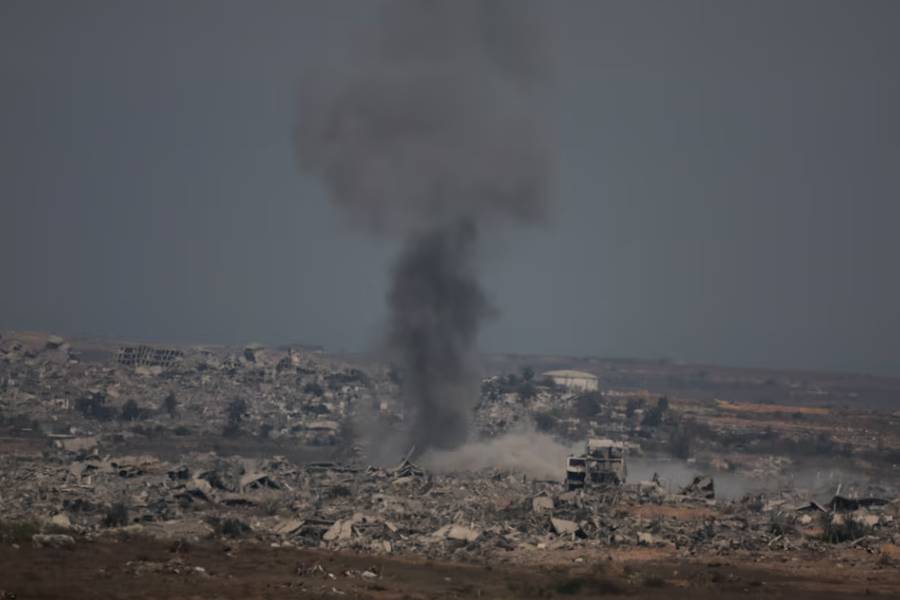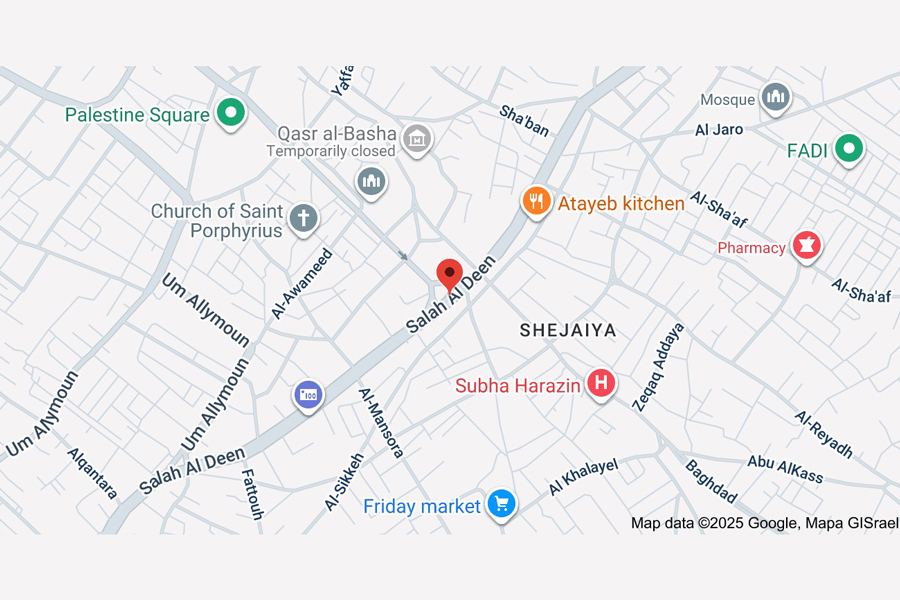Saif
Senior Member
- Joined
- Jan 24, 2024
- Messages
- 17,300
- Likes
- 8,334
- Nation

- Residence

- Axis Group


The Elders’ leaders term Gaza situation ‘genocide’
The Elders group of international stateswomen and statesmen for the first time on Tuesday called the situation in Gaza an ‘unfolding genocide’, saying that Israel’s obstruction of aid was causing a ‘famine’.
 www.newagebd.net
www.newagebd.net
The Elders’ leaders term Gaza situation ‘genocide’
Agence France-Presse . London 12 August, 2025, 22:18

A Palestinian man helps a wounded woman flee the site of an Israeli strike west of Gaza City on Tuesday. | AFP photo
The Elders group of international stateswomen and statesmen for the first time on Tuesday called the situation in Gaza an ‘unfolding genocide’, saying that Israel’s obstruction of aid was causing a ‘famine’.
‘Today we express our shock and outrage at Israel’s deliberate obstruction of the entry of life-saving humanitarian aid into Gaza,’ the non-governmental group of public figures, founded by former South Africa president Nelson Mandela in 2007, said in a statement after delegates visited border crossings in Egypt.
‘What we saw and heard underlines our personal conviction that there is not only an unfolding, human-caused famine in Gaza. There is an unfolding genocide,’ it added.
Helen Clark, former prime minister of New Zealand, called on Israel to open the Rafah border crossing between Egypt and Gaza so aid could be delivered, after visiting the site.
‘Many new mothers are unable to feed themselves or their newborn babies adequately, and the health system is collapsing,’ she said.
‘All of this threatens the very survival of an entire generation.’
Clark was joined by Mary Robinson, former president of Ireland and former UN High Commissioner for Human Rights, on the visit.
She said that international leaders ‘have the power and the legal obligation to apply measures to pressure this Israeli government to end its atrocity crimes’.
The delegation ‘saw evidence of food and medical aid denied entry, and heard witness accounts of the killing of Palestinian civilians, including children, while trying to access aid inside Gaza,’ said the statement.
They urged Israel and Hamas to agree a ceasefire and for the immediate release of remaining Israeli hostages being held in Gaza.
The London-based group also called for the ‘recognition of the State of Palestine’, but added ‘this will not halt the unfolding genocide and famine in Gaza’.
‘Transfers of arms and weapons components to Israel must be suspended immediately,’ it added, saying prime minister Benjamin Netanyahu should be sanctioned.
Israel has faced mounting criticism over the 22-month-long war with Hamas, with United Nations-backed experts warning of widespread famine unfolding in besieged Gaza.
Netanyahu is under mounting pressure to secure the release of the remaining hostages, as well as over his plans to expand the war, which he has vowed to do with or without the backing of Israel’s allies.
Hamas’s 2023 attack on Israel, which triggered the war, resulted in the deaths of 1,219 people, according to an AFP tally based on official figures.
Israel’s offensive has killed at least 61,499 Palestinians, according to the health ministry in Hamas-run Gaza, whose toll the UN considers reliable.
Agence France-Presse . London 12 August, 2025, 22:18
A Palestinian man helps a wounded woman flee the site of an Israeli strike west of Gaza City on Tuesday. | AFP photo
The Elders group of international stateswomen and statesmen for the first time on Tuesday called the situation in Gaza an ‘unfolding genocide’, saying that Israel’s obstruction of aid was causing a ‘famine’.
‘Today we express our shock and outrage at Israel’s deliberate obstruction of the entry of life-saving humanitarian aid into Gaza,’ the non-governmental group of public figures, founded by former South Africa president Nelson Mandela in 2007, said in a statement after delegates visited border crossings in Egypt.
‘What we saw and heard underlines our personal conviction that there is not only an unfolding, human-caused famine in Gaza. There is an unfolding genocide,’ it added.
Helen Clark, former prime minister of New Zealand, called on Israel to open the Rafah border crossing between Egypt and Gaza so aid could be delivered, after visiting the site.
‘Many new mothers are unable to feed themselves or their newborn babies adequately, and the health system is collapsing,’ she said.
‘All of this threatens the very survival of an entire generation.’
Clark was joined by Mary Robinson, former president of Ireland and former UN High Commissioner for Human Rights, on the visit.
She said that international leaders ‘have the power and the legal obligation to apply measures to pressure this Israeli government to end its atrocity crimes’.
The delegation ‘saw evidence of food and medical aid denied entry, and heard witness accounts of the killing of Palestinian civilians, including children, while trying to access aid inside Gaza,’ said the statement.
They urged Israel and Hamas to agree a ceasefire and for the immediate release of remaining Israeli hostages being held in Gaza.
The London-based group also called for the ‘recognition of the State of Palestine’, but added ‘this will not halt the unfolding genocide and famine in Gaza’.
‘Transfers of arms and weapons components to Israel must be suspended immediately,’ it added, saying prime minister Benjamin Netanyahu should be sanctioned.
Israel has faced mounting criticism over the 22-month-long war with Hamas, with United Nations-backed experts warning of widespread famine unfolding in besieged Gaza.
Netanyahu is under mounting pressure to secure the release of the remaining hostages, as well as over his plans to expand the war, which he has vowed to do with or without the backing of Israel’s allies.
Hamas’s 2023 attack on Israel, which triggered the war, resulted in the deaths of 1,219 people, according to an AFP tally based on official figures.
Israel’s offensive has killed at least 61,499 Palestinians, according to the health ministry in Hamas-run Gaza, whose toll the UN considers reliable.








































